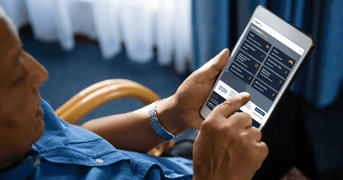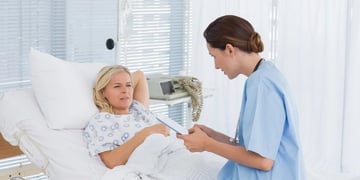What is NHS Improvement Doing About Patient Entertainment?
4 minute read | 24/10/2018

For a better overall experience,, patients need to be entertained adequately during their stay in a hospital. Patients can spend a lot of time alone, and it’s common for patients to run away with their own anxieties which doesn’t help their mental state.
That’s why entertainment systems are so vital to patient wellbeing - they can help to enhance a patient’s hospital experience and reduce the length of their stay too. This post will explore what NHS Improvement is doing about patient entertainment to ensure patients’ needs are being met and they’re receiving the best possible care.
We’ll cover:
- The Current State of Patient Entertainment
- What is NHS Improvement Doing About Patient Entertainment?
The Current State of Patient Entertainment
Patient entertainment has faced recent cuts within the NHS, leaving old and outdated legacy systems still in use. These individual bedside systems were introduced in the early 2000s and were an advancement on the small TV sets that used to be rolled out on wards.
While this was revolutionary in 2005, technology has since moved on. And at some pace too. These legacy systems have been struggling to keep up for the last few years, but they are still ever-present on the majority of hospital wards. Not only are they now unsuitable to provide the patient with a good quality of entertainment, but they can also prove to be very expensive to the patient. Prices have been reported to be up to £10 a day.
In addition, these bulky, legacy systems aren’t user-friendly at all and are incredibly outdated. Yet they are still used widely throughout the NHS today. In order to improve patient entertainment, it’s clear these systems need updating with a far more modern version.
NHS Improvement is responsible for overlooking and assisting the NHS in meeting their short-term challenges to make for a stronger, longer future. The organisation offers the support needed for patients to be as safe as possible during their time in hospital, distribute high-quality care and help local health systems become more financially sustainable.
What is NHS Improvement Doing About Patient Entertainment?
Nobody likes being in a hospital. It can often be a very isolating experience and many patients feel as though they’re completely detached from the outside world, due to allotted visiting hours and restricted access to entertainment and information. Many hospitals aren’t great for mobile signal either, which can leave patients struggling to stay in touch with loved ones.
With a dedicated WiFi-based patient entertainment service, patients can easily stay in contact with the outside world via video calls, emails and various messenger apps. Just like they would be able to outside of the hospital. Modern patient entertainment systems provide these functionalities and enhance this even further in a variety of ways.
Patients will have access to live TV, on-demand videos, streaming channels, radio stations and much more which allows them to stay occupied throughout their stay.
What takes this to the next level is that rather than the big, clunky legacy systems, patients can do all of this on a device of their own choice, whether it’s their own devices, or tablets provided by the hospital. In particular, being able to use their own smartphone is a big step towards improving the hospital experience. It means patients will be thoroughly entertained on a device that they’re already familiar with, making their experience more seamless.
With an approach like this, the patient is at the forefront of the NHS’ thoughts and it also helps improve staff efficiency in various different ways. These are:
- Vital information relating to the patient’s healthcare can easily be accessed by both staff and patients. Staff no longer need to find this information, and patients no longer need to ask to see it. Both parties can access this information (provided in the form of a digital window into the medical practitioner’s notes) via their smartphones or other devices.
- By greatly improving the patient’s mood and overall experience, they’re more likely to cooperate with the NHS staff. This can improve the quality of the healthcare patients receive and free up beds more quickly.
- Better resource management. For example, integrating the system with the Trust’s meal ordering provider can massively help to reduce food wastage and unnecessary spending. Individual patients can consult a digital menu and place their order via the system, as opposed to a manual meal card. Patients are linked to their bed and ward number so if they move, meals can be redirected to their new location.
- Preventing ad-hoc patient requests from interrupting staff. Patient entertainment systems have a “service request” feature where patients can make small requests, such as asking for an extra pillow or blanket. These requests will then go to the appropriate member of staff, which prevents the rest of the team’s productivity being affected.
- Patient feedback tools can be integrated into the entertainment system. A happier patient is also more likely to give unbiased, reasonable feedback which is more useful for the Trust as it can drive improvement in the NHS.
How Can Your Trust Take to Improve Patient Entertainment?
The current systems that are rolled out in hospitals limit both the patients and NHS staff in many, major ways. This can significantly impact patient happiness and satisfaction during their time on the ward and hinder the staff from performing at maximum efficiency.
These limitations are the reasons why many hospital Trusts are seeking to integrate an improved patient entertainment system. If you want your Trust to keep patients satisfied and staff working at their best, you should consider implementing the right patient entertainment system. One system that is more cost-effective and user-friendly is SPARKⓇ Media.
If you’d like to read more about the power of WiFi, patient entertainment solutions and the benefits they can both bring to the NHS, download a free copy of our SPARKⓇ Media brochure below.
About the author
Rebecca O'Donovan
Becky is the Marketing Director at SPARK TSL, of whom she has worked for since 2012. She is responsible for high-level marketing strategy focusing on lead generation and aiding the vision of the business to ensure business growth.
More articles by the author
Related articles
 Healthcare Industry
Healthcare Industry
Why Your Hospital Needs a Patient Engagement Platform | SPARK TSL
As we venture further into the digital era, patient engagement has become increasingly important for the ...
 Healthcare Industry
Healthcare Industry
5 Benefits of Patient Education Systems for Hospitals
 Patient Experience
Patient Experience
How Improving Patient Experience Can Save the NHS Money
Improving patient experience is one of the most efficient ways to reduce NHS costs. Whether it’s combatting ...



